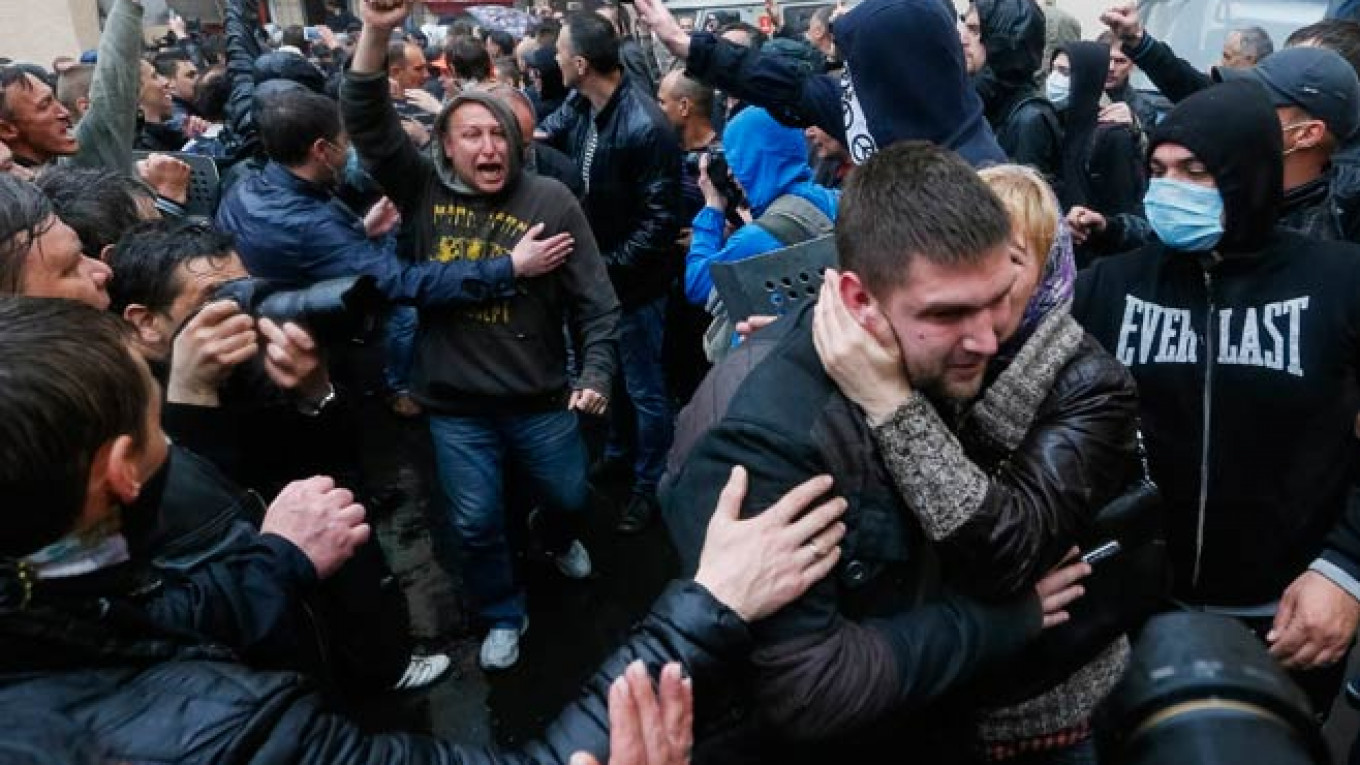Pro-Russian militants stormed a Ukrainian police station in Odessa on Sunday and freed nearly 70 fellow activists as the country's leaders lamented a police force they said was widely undermined by graft or collaboration with separatists.
Militants chanted "We will not forgive!" and "Russia!" as they smashed windows and broke down the gate at the compound two days after more than 40 pro-Russian activists died in a blaze at a building they had occupied after clashes with pro-Kiev groups.
Odessa police said 67 activists were allowed to walk free.
Some police officers were offered the black-and- orange St. George's ribbon, a Russian military insignia that has become a symbol of the revolt, and were cheered when they accepted it.
As rebellion simmered, questions were raised about the ability of the army as well as police to confront an uprising Kiev says is backed by Moscow and led in the field by Russian special forces — an accusation the Kremlin denies.
Police in the eastern port of Mariupol said pro-Russian rebels had tricked soldiers at a checkpoint into eating food laced with a sleeping potion. The soldiers were then bundled off along with their weapons, prompting long talks to free them.
Prime Minister Arseniy Yatsenyuk, speaking in Odessa on the western, Black Sea stretch of Ukraine's coast, accused Russia of engineering Friday's clashes there that led to the deaths of more than 40 pro-Russian activists in a blazing building.
But he was pointedly critical of the police.
"If the law enforcement system in Odessa had worked not exclusively on the 'Seventh Kilometer' and had protected people, then these terrorist organizations would have been foiled."
The Seventh Kilometer is an open market on the edge of Odessa, associated in the popular consciousness with the corruption and black market business that have marked Ukraine's 23 years of post-Soviet independence. He said changes were being made in the leadership of the police in Odessa.
Friday's clashes were the deadliest since Moscow-oriented President Viktor Yanukovych was forced to flee in February and pro-Russian militants launched uprisings in the industrial east. They also marked the first serious disorder beyond eastern areas since Yanukovych fell, heralding possible trouble for Kiev.
Outright civil war in Ukraine and the division of a country the size of France would have serious implications for countries around, not least for Russia and for NATO states bordering it.
"There were dozens of casualties resulting from a well-prepared and organized action against people, against Ukraine and against Odessa," said Yatsenyuk, whose Western-backed government took power after Yanukovych fled and aims to hold a presidential election to replace him in three weeks time.
Friday's deaths occurred after running clashes, involving petrol bombs and gunfire, between supporters and opponents of Moscow on the streets of Odessa, where the majority of people speak Russian. The pro-Russian activists were trapped in a building as it burned down.
It was not clear who had thrown the petrol bombs that started the fire but pro-Russian demonstrators at the police station on Sunday blamed pro-Kiev activists.
About 300 pro-Russian activists forced their way into the Odessa police station, gathering in the courtyard, while about a thousand more surrounded the modern complex.
Several police officers stood at the front of the building talking to demonstrators.
Yatsenyuk dismissed Russian accusations that his government was provoking bloodshed in the east with an operation to restore Kiev's authority in a series of cities under rebel control.
"The process of dialogue had begun, only it was drowned out by the sound of shooting from automatic rifles of Russian production," he said.
Focus of tension on Sunday remained Odessa, traditionally a melting pot of cultures, with pro-Russians accusing Kiev of engineering events that led to the deaths on Friday.
"They are just standing there and shouting for us to release the detainees," a spokesman for the regional police said.
He said about 170 people were initially detained on Friday, but since then about 50 had been released.
A Message from The Moscow Times:
Dear readers,
We are facing unprecedented challenges. Russia's Prosecutor General's Office has designated The Moscow Times as an "undesirable" organization, criminalizing our work and putting our staff at risk of prosecution. This follows our earlier unjust labeling as a "foreign agent."
These actions are direct attempts to silence independent journalism in Russia. The authorities claim our work "discredits the decisions of the Russian leadership." We see things differently: we strive to provide accurate, unbiased reporting on Russia.
We, the journalists of The Moscow Times, refuse to be silenced. But to continue our work, we need your help.
Your support, no matter how small, makes a world of difference. If you can, please support us monthly starting from just $2. It's quick to set up, and every contribution makes a significant impact.
By supporting The Moscow Times, you're defending open, independent journalism in the face of repression. Thank you for standing with us.
Remind me later.






